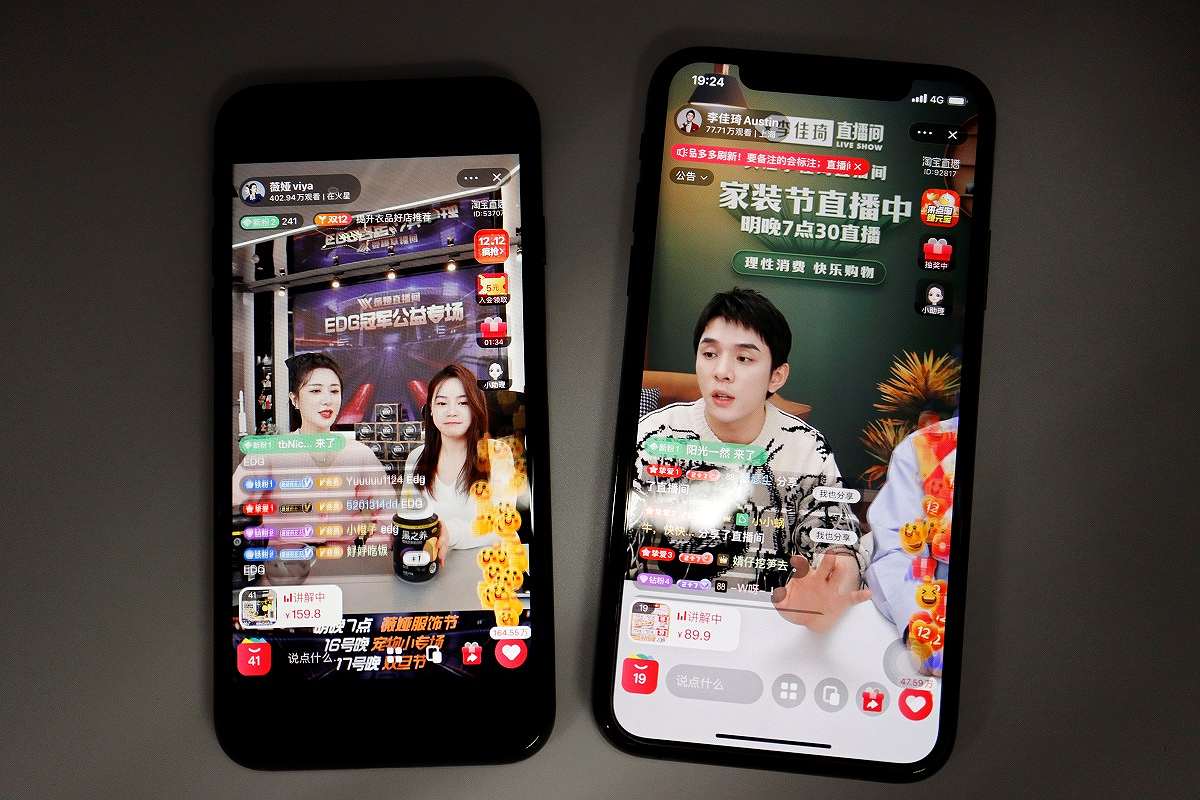
Livestreaming sessions by Chinese livestreamers Li Jiaqi and Viya, whose real name is Huang Wei, left, are seen on Alibaba’s e-commerce app Taobao displayed on mobile phones on Dec. 14, 2021.
17:10 JST, July 17, 2023
SHANGHAI (Reuters) — When tech giant Apple joined China’s livestreaming frenzy, a major driving force of the e-commerce boom in the world’s second-biggest economy, it launched without deep discounts or a celebrity host to pull millions of viewers.
Yet Apple’s show, hosted by product experts offering tips on making movies with iPhones or using the Apple Watch as a workout aid, drew 300,000 likes and more than 1.3 million viewers within an hour in May.
Apple’s move illustrates how livestreaming is evolving in China from an initial model of massive sales via big discounts, as more big brands seek greater control of a process rendered costly by a fragmenting market and growing use of superhosts.
“You have to move towards content instead of promotion,” said William Lau, chief executive of multibrand beauty retailer Bonnie and Clyde.
“When you focus on building content instead of offering 40% off, you actually get more resonance with the consumer and you also get follow-up in terms of return sales.”
Livestreaming generated sales of $480 billion in China last year that are likely to jump 30% this year, says research firm eMarketer, even in a difficult economy, showing the industry’s resilience.
Stellar growth boosted by the COVID-19 pandemic saw the industry employ more than 1.23 million livestream hosts by 2020, says researcher iResearch, along with numerous accompanying livestream-related training academies and agencies.
One of China’s best known hosts is Li Jiaqi, the so-called “lipstick brother,” who sells everything from toilet paper to home appliances on a show offering viewers the best discounts via Alibaba’s Tmall.
While Tmall and Li Jiaqi remain powerful, brands moving away from that strategy are cutting reliance on massive discounts and even his famous exhortation, “Oh my god! Buy it!” in favor of a focus on storytelling.
“Brands are building up their own channels as opposed to paying these other guys 40% to 50% of the revenue from a livestream,” said Jacob Cooke, co-founder and chief executive of Beijing e-commerce consultants WPIC Marketing + Technologies.
“That’s just unsustainable,” he said, adding that a livestream with Li cost about 30 times more than one with hosts from China’s professional agencies that recruit and train livestreamers before connecting them with brand clients.
“If the product fits the character of the host, the consumer will tend to believe, ‘Oh, this is the product you use,’” said Zephyr Liu, Asia-Pacific head of women’s apparel brand Ba&sh.
“So they see someone recommending a product from the bottom of their heart instead of just selling.”
Liu once thought her brand’s price point of about 2,000 yuan ($277) for its dresses made it incompatible with bargain-heavy livestreaming.
But after selling for six months on Douyin, the Chinese version of TikTok, using hosts recruited via an agency, as well as smaller-scale influencers, Liu has seen livestream hosts benefit her sales, even for full-price pieces.
Such efforts succeed, she said, by letting audiences communicate directly with the host during broadcasts to get immediate answers to queries on fit, color and styling.
Fragmentation
“Brands are optimistic and open-minded about livestreaming,” said Shining Li, vice president of livestream agency Romomo.
“It’s important to build a solid livestreaming channel because it’s an important sales and communications tool.”
An arm of brand partner Buy Quickly, the agency helps link companies such as Lancome, Under Armor and Hugo Boss with a stable of more than 150 full-time hosts.
As an omnichannel brand partner, Buy Quickly also offers services such as operating online stores and shooting advertising campaigns for global brands.
But growing industry fragmentation leaves more platforms and hosts jostling for eyeballs.
The dominance of pureplay sales platforms such as Alibaba’s Tmall and Taobao, along with JD.com, is increasingly challenged by entertainment and information-led platforms such as Douyin and Xiaohongshu.
Consumers use the latter, an Instagram-like app, to research everything from hotel recommendations to manicure inspiration.
Regulatory scrutiny has also had an impact.
While Li Jiaqi and fellow superhost Viya once garnered about half of livestreaming sales on Alibaba’s platforms, tax scandals and a poorly-timed broadcast featuring a tank-shaped cake have led to both being taken off air at different times.
With Viya yet to return, such episodes demonstrate the risk of relying on just one or two hosts.
Superhosts might have the biggest reach, but that may matter less than reaching the right people, said Lexie Moris, China vice president at activewear brand Sweaty Betty.
“There is a whole industry of livestreamers that have a tiny audience, compared to the biggest livestreamers, but one which is targeted and can convert pretty well,” she said.
Top Articles in World
-

China Confirmed to Be Operating Drilling Vessel Near Japan-China Median Line
-

China Eyes Rare Earth Foothold in Malaysia to Maintain Dominance, Counter Japan, U.S.
-

Japan, Qatar Ministers Agree on Need for Stable Energy Supplies; Motegi, Qatari Prime Minister Al-Thani Affirm Commitment to Cooperation
-

North Korea Possibly Launches Ballistic Missile
-

10 Universities in Japan, South Korea, Mongolia to Establish Academic Community to Promote ICC Activities, Rule of Law
JN ACCESS RANKING
-

Univ. in Japan, Tokyo-Based Startup to Develop Satellite for Disaster Prevention Measures, Bears
-

JAL, ANA Cancel Flights During 3-day Holiday Weekend due to Blizzard
-

China Confirmed to Be Operating Drilling Vessel Near Japan-China Median Line
-

China Eyes Rare Earth Foothold in Malaysia to Maintain Dominance, Counter Japan, U.S.
-

Japan Institute to Use Domestic Commercial Optical Lattice Clock to Set Japan Standard Time





















